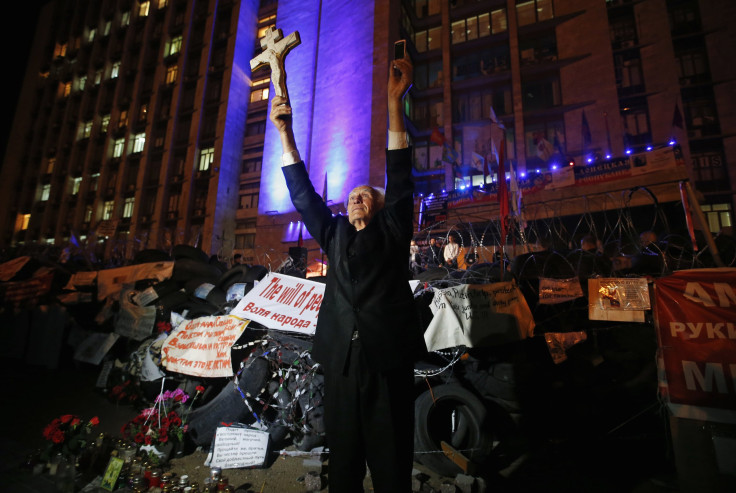After Referendum On Autonomy, Skeptical East Ukrainians In Donetsk Fear War

DONETSK, Ukraine -- Separatists have won the vote in eastern Ukraine handily, with 89 percent of those who took part in Sunday's referendum saying they wanted autonomy from Ukraine. That opens the way for possible annexation of the region by Russia, as happened in Crimea after a similar referendum in March.
But that number is not convincing local residents who aren't pro-Russian. Stepan, a 20-year-old computer science student at an eastern Ukrainian college, said he didn't believe the results of the ballot, held by the pro-Russian separatists behind the self-proclaimed “Donetsk People’s Republic.” About 60 percent of residents want to remain part of Ukraine, said Stepan, who did not want his last name to be used.
That figure isn't far from the results of a poll conducted by the Pew Research Center in the region, according to which 77 percent want to remain part of Ukraine while 14 percent want secession.
Russian President Vladimir Putin called last week for the vote to be delayed. But the referendum happened anyway, unrecognized by any nation, and the Kremlin now says that it expects the outcome of the referendum to be implemented in a “civilized manner.”
The Ukrainian government in Kiev and the West say the vote is illegitimate. The rebel group holding the vote was not made up of elected representatives, and the election commission has seemingly no independence from the self-styled republic's authorities.
Sviatoslav Yurash, a member of the activist group Euromaidan PR, part of the movement that toppled pro-Russian President Viktor Yanukovych in Kiev, said the vote, although not democratic, provides some insight. “[It] can hardly be called a referendum, (but) it was a pretty interesting social poll on the matter of how disgruntled some people feel in this region,” he said.
There are concerns that the referendum will help push the country into civil war, with Russian troops entering Ukraine. “I think there is a great possibility of invasion and in this case there can be a war,” Stepan said.
According to Yurash, the vote will encourage lawlessness in the region. “These gangs of people who are kidnapping, beating, intimidating, killing different people all around the Donetsk region would want to see this as so-called legitimization of what they are,” he said.
The rebels say 80 percent of voters in Donetsk voted in favor of self-rule, although it is unclear what the term means for separatists.
According to some reports, the rebels in Donetsk have asked to join Russia, but an official with the “Donetsk People’s Republic,” Boris Litvinov, said this is a misunderstanding and that the separatists actually want to join a customs union with Russia -- but first they want the Ukrainian government to take its forces out of the region.
“If the Ukrainian government continues to do what it happens to be doing for the last months, we will have to defend ourselves,” he said, referring to the Ukrainian army's push against the rebels. “They fight against their own people.”
A resident of Donetsk, Elena Horn, said she wanted to join Russia "because we are brothers … and I don’t want to be humiliated and we don’t want our culture to be endangered.” A majority of people in eastern Ukraine are native Russian speakers, whereas most in the rest of the country are native Ukrainian speakers.
Along the way to joining Russia, Horn said she accepted there might be obstacles, such as those faced by residents in Crimea, where there have been reports of huge lines at banks that have run out of money and increases in food prices. Similar cases have occurred in Donetsk and the surrounding region of Donbass over the past week.
Fellow separatist Nina Abramova said she was part of a grassroots effort and denied Kiev’s and the West’s accusation that Russia is behind the push for independence. “It was us who made it possible,” she said. “We were abandoned by politicians and oligarchs, and Russia has nothing to do with it.”
There's now another vote in the works, this one considered legitimate by most of the international community: the Ukrainian presidential ballot on May 25, meant to choose an elected president after Oleksandr Turchynov took the interim position as Yanukovych fled the country.
But according to one separatist leader quoted by Russian news agency RIA, the eastern region of Luhansk (Lugansk in Russian) would boycott that election. Rebels say the region may hold its own referendum on joining Russia instead.
© Copyright IBTimes 2024. All rights reserved.











